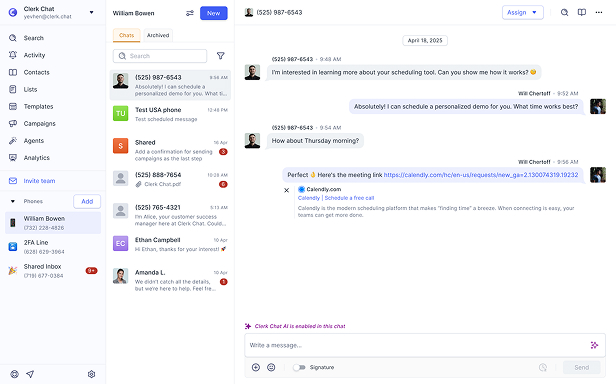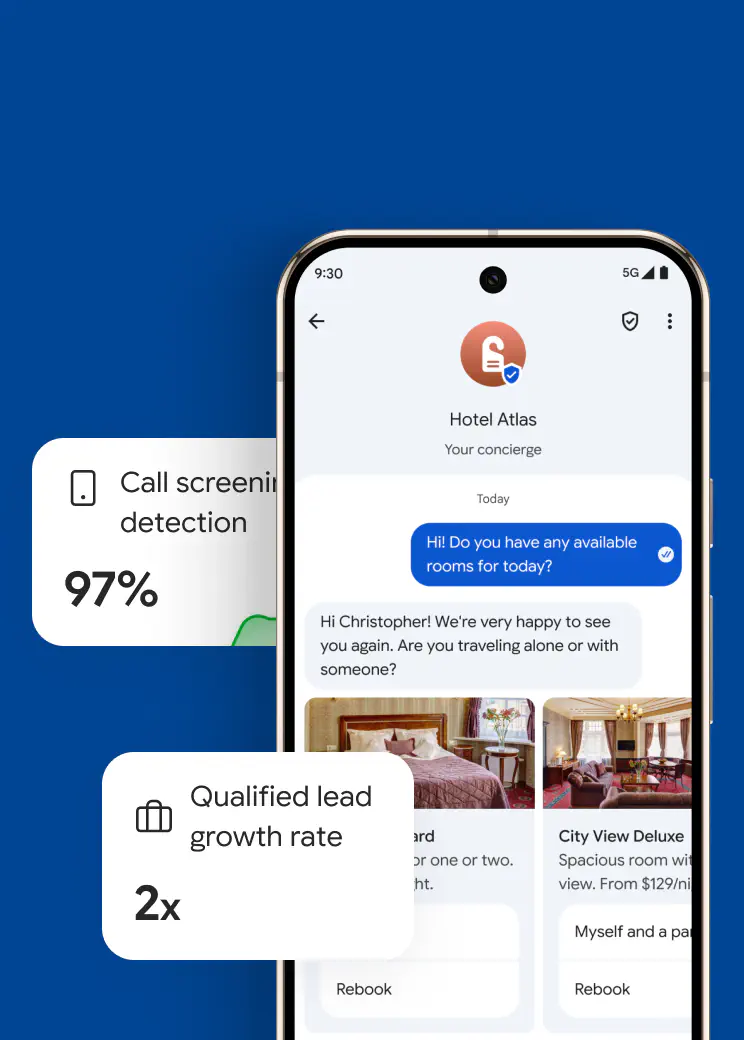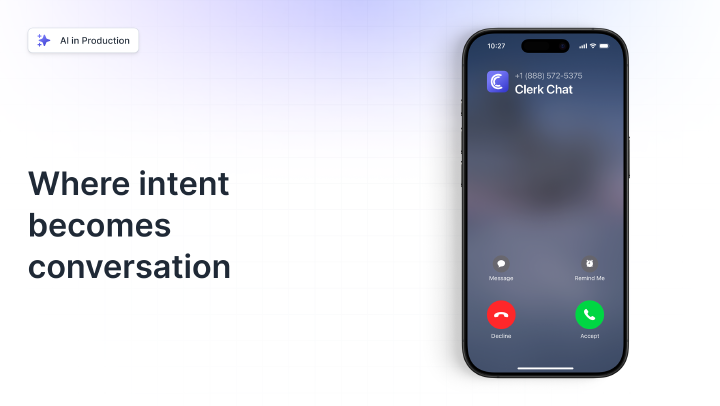10DLC Registration: What it is, Why it Matters, and How to Get Started
By Igor Boshoer
- Published: March 11, 2025
Free 10DLC Whitepaper
If you’re the head of a sales, support, or marketing team, or someone responsible for sending text messages to customers in bulk, you need to know about 10DLC (10 Digit Long Code) numbers.
Today, these numbers form the foundation of compliant, cost-effective, and efficient A2P (Application to Person) text messaging strategies. When your company sends messages to customers using an application or system (different to just texting your friends or family), it’s A2P messaging.
When your A2P messages come from a standard 10-digit long code (the typical (xxx) xxx-xxxx format) they need to adhere to specific mobile carrier rules. Embracing 10DLC numbers for marketing and customer communication is an excellent way to build trust and recognition with your audience (as well as tapping into some extra benefits).
However, if you haven’t already handled the A2P 10DLC registration process, you could expose yourself to significant fines, and repercussions. Here’s your guide to everything you need to know about 10DLC, why it’s important, and how you can get registered.
In this article:
The Rise of A2P Registration Requirements
To fully understand why 10DLC matters for businesses, you first need a basic insight into A2P, or application to person texting. For years, text messaging has offered people a way to communicate through a quick, convenient, and casual phone-based medium.
In the past, communication happened primarily from person-to-person (P2P messaging). But for businesses, sending thousands of messages to customers individually was costly and inefficient. That’s why they began using text messaging software, to simplify mass texting.
Unfortunately, in the early 2000s, many mass texting services sent communications through an SMS gateway, with short codes. It could take up to 2 seconds to send a single message, which meant sending thousands of texts could take hours.
That’s where 10 Digit Long Codes came in, introducing a new, more efficient way to send thousands of messages faster, more cost-effectively, and with greater “throughput.”
Is 10DLC enforcement blocking your business messaging?
Let’s get your business texting back on track.
Register NowWhat is 10DLC (10 Digit Long Code)?
10DLC
10DLC, or 10-Digit long code, is the industry-led long code solution designed for A2P messaging within the US and North America. It allows companies to send business messages from a number in a format their customers are likely already familiar with, such as: 123-456-XXXX.
The number features the standard area code and structure used for typical P2P messaging. The concept of 10DLC stemmed from a necessity to provide organizations with a versatile alternative to traditional short codes for messaging.
In the short code vs 10DLC debate, short codes (shorter, easy-to-remember numbers), were previously widely used for commercial messaging. However, they were expensive to access, had limited availability, and required companies to use a different number.
From an expense perspective, some short codes start at around $1,000 per month – some companies even had to share these numbers initially to reduce costs. 10DLC, on the other hand, is a more affordable option, allowing companies to engage with customers through a standard 10-digit number they already owned. Rather than buying a new number, companies simply had to port a phone number into the A2P business messaging service they were already using.
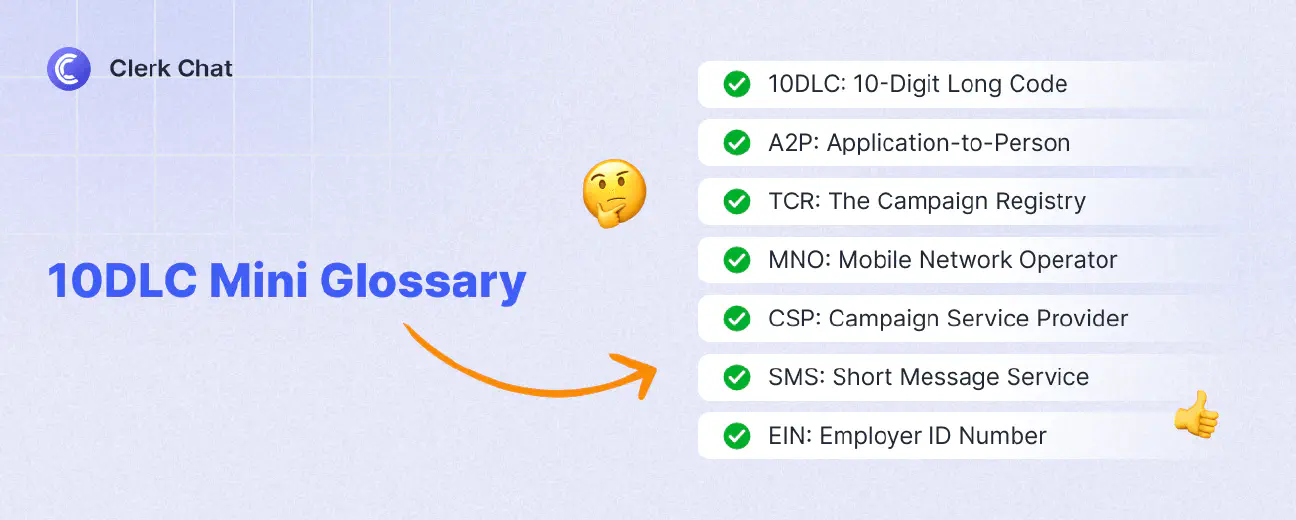
10DLC Regulations and Compliance
The tricky thing about 10DLC numbers, is that they’re subject to specific regulations. In previous years, bad actors began abusing text messages, using them for phishing and spamming texts, causing serious problems for consumers. The Mobile Network Operators implemented regulations to prevent SMS from becoming another cluttered, overwhelming, and dangerous channel.
The goal of 10DLC registration was to ensure The Campaign Registry (TCR) and mobile network operators could validate the messaging strategies of companies, maintain awareness of industry trends, implement best practice guidelines, and penalize potential violators.
To register for a 10 digit long code number, companies need to demonstrate compliance with a variety of SMS standards, primarily laid out by the Telephone Consumer Protection Act (TCPA) – which was initially introduced in 1991.
TCPA
The Telephone Consumer Protection Act (TCPA) is a U.S. law requiring businesses to get consent before sending marketing texts and offer opt-out options, crucial for 10DLC A2P messaging compliance.
For instance, organizations need to obtain consent prior to contacting people – and they need to obtain specific consent for sending different types of messages (such as marketing or transactional messages). Beyond that, businesses also need to register their brand and campaigns with The Campaign Registry, which involves:
- Providing details about why the company is sending messages, how many messages they’re sending, and who will receive these notifications.
- Being transparent within messages and providing insights that ensure the recipient knows where the message comes from.
- Avoiding any messaging strategy that could be interpreted as spamming, fraudulent, or misleading for customers.
- Ensuring SMS opt-in and opt-out policies are clearly outlined.
Who Needs 10DLC Registration?
If you send SMS or MMS messages to any US or North American customers using standard, long-form code numbers and enterprise texting solutions then you need to complete a 10DLC registration. This process is now a requirement for any company in every industry.
All 10DLC campaigns need to be identified and approved before they reach customers, or you risk serious issues. In some cases, mobile operators simply won’t send a message that isn’t connected with a valid A2P campaign registration, meaning that you waste money sending texts that aren’t delivered.
On top of that, you could face fines of up to $10 per message. If you’re sending hundreds of thousands of messages at a time – that could lead to a very costly campaign.
The good news is that registering your 10DLC number is actually very beneficial. It allows companies to access a more cost-effective messaging solution, and use a number that’s more likely to be familiar to their target audience, enhancing trust and deliverability rates.
Once registered, companies in a range of industries can use 10-digit long codes to send all kinds of messages. For instance, retail companies can use text blasting services to share promotional texts with opted-in customers, or deliver always-on customer support.
Real estate companies can use texts to confirm appointments for viewings, inspections or closings, while nonprofit organizations can send alerts about events and volunteering opportunities. Even finance companies can use A2P messaging to share verification codes with clients.


The Benefits of A2P 10DLC Registration
While it’s still possible to send a text from a different number (not your traditional business number) to customers, there are plenty of good reasons why companies are embracing 10DLC. These numbers are familiar, relatively easy to access, and cost effective, making them ideal for all kinds of large-scale texting campaigns. Investing in 10DLC registration means you benefit from:
- Better deliverability: As part of the campaign process, your business must complete a Brand Registration. Many messaging companies, like Clerk Chat, will assist with this. Carriers view verified messages from registered brands as less likely to be spam. This means your messages typically benefit from higher SMS deliverability rates.
- Trust and brand recognition: A2P 10DLC allows you to send messages from a local or recognizable area code. This makes your brand more approachable, increasing the chances of engagement. Plus, you get to continue using the number your business already has for SMS.
- Cost savings: A2P 10DLC pricing is generally more budget-friendly compared to dedicated short codes. This makes it a cost-effective option for businesses of all sizes, allowing you to leverage the power of SMS marketing without breaking the bank.
- Two way communications: Unlike short codes, which are primarily used for one-way communication, 10DLC facilitates two-way messaging. Customers can reply to your texts, enabling real-time conversations and improved customer service experiences.
- Message throughput: Message throughput for 10DLC messages is allocated according to the registered campaign use case. However, for most companies, A2P 10DLC offers far higher throughput than the standard 1 MPS for long-code messaging.
10DLC Registration Requirements
Mastering 10DLC registration can seem a little complex. Notably, you only need to register if you’re going to be sending messages to US or North American numbers. If you’re sending messages exclusively to numbers outside of those regions, you won’t need to register. However, you may need to verify compliance with standards in other countries.
To be approved for a 10 digit long code A2P campaign, companies need to complete a brand registration and campaign registration with The Campaign Registry. They also need to prove that their customers have opted-in to receive messages from you. Plus, there will be fees to pay.
Businesses in certain industries will be rejected directly – such as those operating in the payday loans landscape or selling illicit materials.
If you’re worried about a 10DLC deadline, the good news is that there isn’t an official one in place. However, if you do want to send SMS messages through a standard long code number, it’s better to start the registration as soon as possible.
The 10DLC SMS Registration Process
The 10DLC registration process is managed by The Campaign Registry, and it’s relatively simple on the surface – though it’s often much easier with the help of a supportive provider, like Clerk Chat. For the most part, the process involves gathering a lot of information, submitting it to TCR, and waiting for your application to be approved – before you start sending messages.
These are the main steps involved:
10DLC Brand Registration
The first step is registering your brand with The Campaign Registry, establishing your company’s identity. You’ll need to gather a lot of information for this process. Fortunately – you can align it all within your Clerk Chat platform, and submit your application automatically from there.
The key things you’ll need to collect include your:
- Legal company name
- Brand name
- Country of registration
- Organization legal form (i.e. nonprofit, government, etc.)
- Company EIN and issuing country
- Address
- Point of contact
Once you have all those details, you can submit them to The Campaign Registry directly from the Clerk Chat app (under Settings and Brand Registration).
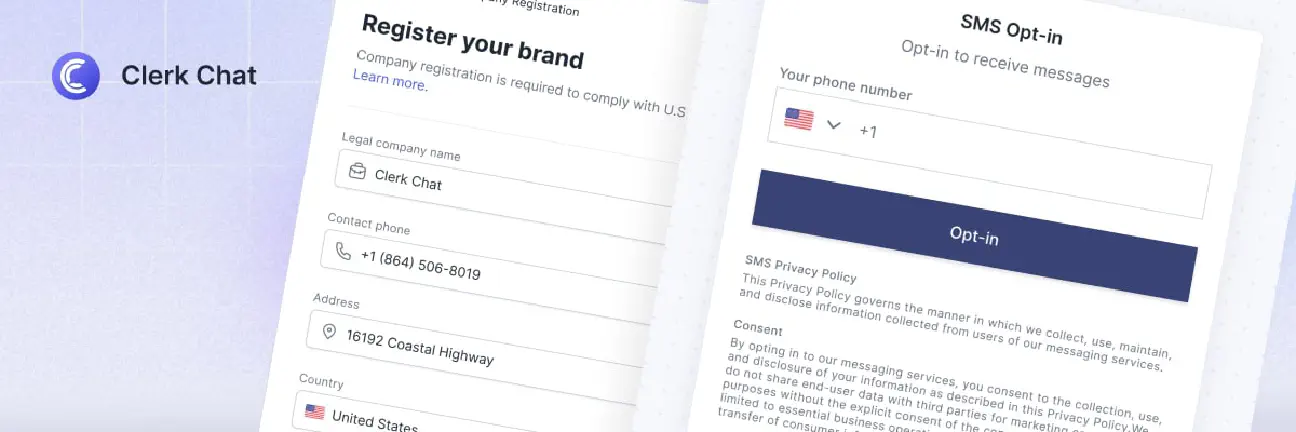
Our advice here is to be as detailed and accurate as possible – as this should speed up the approval process. Keep in mind at this stage that you’ll be asked to disclose where you received the contact details for the people that you’re going to messaging. You need to be able to provide proof that consent has been granted, and show you have a privacy policy on your website.
10DLC Campaign Registration
Once you’ve submitted your brand information, you’ll need to complete an A2P campaign registration. This basically involves telling the TCR why, when, and how often you’re going to be texting the people who “subscribed” to your service.
Provide a detailed insight into how you’re going to be using a small business texting service. As an example, are you going to be sharing information about new products, and promotions to customers who have actively asked for those notifications?
Are you using an SMS customer service platform to support your customers – and is there a chance that your team might recommend products to them based on their questions? Are you going to be sending out transactional text messages or multi-factor authentication codes?
You might need to provide examples of your SMS templates to help TCR determine your messages aren’t going to be “spammy” or fraudulent, so be prepared.
Remember, during this stage, you’ll need to answer questions about your opt-in and opt-out strategy. Make sure you gather information to share with The Campaign Registry about how you collect opt-in details (such as through website forms, clickable buttons, or SMS keywords).
Demonstrate that your customers have an easy way to opt-out of receiving messages too – whether it’s by sending a specific text to your team, or getting in touch via email, phone call, or elsewhere.
From there, wait for TCR to approve your campaign before you begin texting.
Tips for Getting Started with A2P 10DLC Messaging
If you’re feeling anxious about diving into the world of 10 digit long codes, Clerk Chat is here to help – we can help streamline the registration process for you, and provide you with extra guidance, in the form of resources like our TCPA compliance guide.
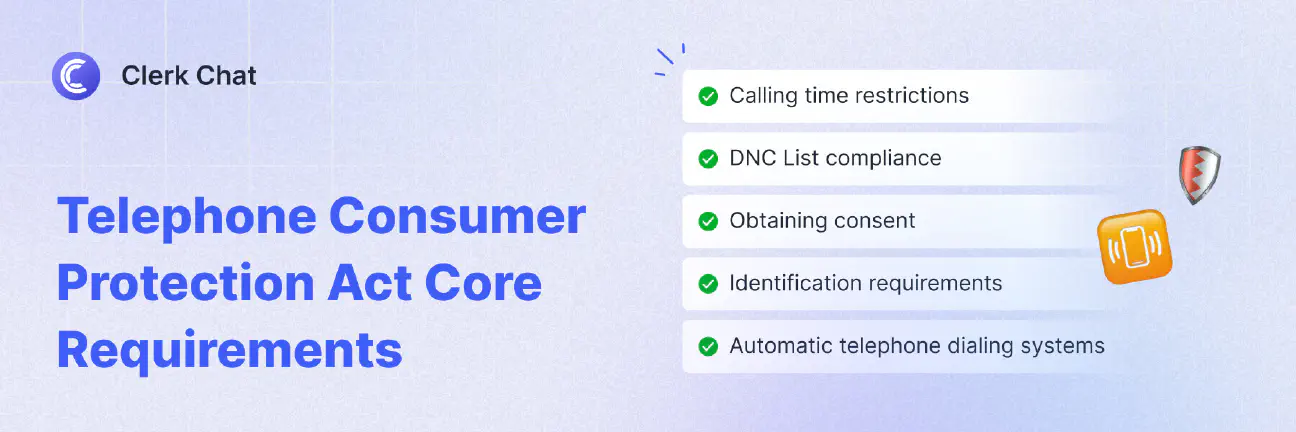
However, if you’re keen to dive in, here are some top tips:
- Do your Research: You can’t really use a personal cell phone when sending business messages, so it makes sense to look for a reputable platform or app that can help you enable messaging on a 10DLC phone number. Consider factors like pricing, features, ease of use, and customer support.
- Select the Right Number: When creating an account with Clerk Chat, you have the option to get a new phone number or activate an existing one - potentially the number your customers or clients are already using. If you need to switch cell phone carriers, do that early on.
- Register Early: Partner with your provider and get started with the registration process as soon as possible. At Clerk Chat we guide you through the registration process as needed. This helps your business and message use cases be accepted by mobile carriers.
- Explore a range of messaging options: Remember to think beyond SMS and MMS when you’re developing messaging campaigns. Depending on your specific needs, you might want to look at RCS vs SMS. However, keep in mind that since RCS defaults to SMS when RCS isn’t enabled, 10DLC registration is still crucial.
- Stay Informed: Make sure you’re staying up to date with new compliance standards as they emerge. For instance, the rise of AI in the telecom industry could lead to new rules to follow. Don’t risk falling behind and being exposed to serious fines.
Pricing and Fees for 10DLC Registration
Notably, there are fees associated with 10DLC SMS registration – and they can vary. The two main categories of fees to be aware of are: registration fees and carrier fees.
Registration fees apply when you’re registering your brand and use case for your 10DLC A2P campaigns. These fees include:
- Sole proprietor fees: $4
- Low volume standard fee: $4
- A2P standard registration fee: $44
- US A2P campaign use case fees: $15
There are also recurring monthly campaign registration fees to consider. These start at $2 per month for a sole proprietor, and range to $5 per month for specialist companies (like those in the emergency services space).
Carrier fees are the prices you pay for each message you send. Each carrier has its own pricing structure. For instance, AT&T and Verizon charge around $0.003 per registered SMS message, and $0.005 per registered MMS message. T-Mobile charges $0.003 per SMS message, and $0.01 per MMS message.
If you’re not sure about your carrier’s fees, contact them in advance to ask about the prices for custom messages in different formats. On top of those two central “types” of fees, there are also fees for appeals if you want to argue against TCR rejecting your application. These start at around $10 per appeal, and become more expensive if you need to appeal again.
Remember, you’ll also need to account for the costs of using your A2P messaging software or system – the tools you use to send text messages from a computer and manage campaigns.
How Long Does A2P Registration Take? 10DLC Timeline
10DLC registration is a multi-step process that can take a little time. After all, you need to submit your brand registration and your A2P registration (for each specific campaign). With the help of a company like Clerk Chat, submitting the right information can take just a few minutes.
Is 10DLC enforcement blocking your business messaging?
Let’s get your business texting back on track.
Register NowTypically, you’ll hear back from The Campaign Registry pretty quickly if your brand registration is approved. However, it can take up to 7 days, depending on various factors. Finding out whether your campaigns have been approved can take a little longer.
A DCA (Direct Connect Aggregator) will need to vet your campaign and make sure it meets all the right standards and requirements. Usually, they’ll respond around 2-5 days after you find out whether your brand has been approved.
For the most part, many companies will be able to start sending messages with 10DLC codes pretty quickly. The biggest factor determining whether the process might be delayed, is if The Campaign Registry finds any discrepancies in your submission or needs to request extra information. That’s why it’s so important to make sure your registration is detailed and accurate.
The best way to prepare and boost your chances of quick results is to do your research. Make sure you know all the differences between “standard use cases and special use cases” for 10 digit long code numbers, and gather all of the information you need in advance.
If you have any questions about anything, whether it’s about using VoIP and non-VoIP numbers for texting, or leveraging specific tools, reach out and ask.
Simplifying 10DLC Registration
Ultimately, 10 digit long code numbers are the future of business texting. They’re the easiest way to make sure you can connect with your customers using familiar numbers, without incurring additional costs and complexities when you’re launching your strategy.
When you complete your 10DLC registration, you set yourself up for a successful messaging strategy, and signal to both customers and carriers that you’re committed to following compliant practices. Plus, you save yourself from falling victim to hefty fines and penalties.
The good news? Clerk Chat makes 10DLC simple. Our platform doesn’t just open the door to conversational AI in customer service and multi-channel messaging tools. We work with you to ensure that you can comply with all the right regulations and guidelines.
Our user-friendly platform streamlines 10DLC registration and campaign management. It also allows you to enable your existing business line or activate a new one in seconds.
Ready to experience compliant, conversational messaging? Schedule a demo today.
An innovator by nature, Igor is dedicated to translating the technical aspects of product development into actionable business strategies and sales growth. He thrives when building scalable infrastructures while leading global teams to success. In his free time he indulges in his passions for film, mathematics, and engineering. Find his tech expertise in films like The Wolf of Wall Street.
In this article:
- The Rise of A2P Registration Requirements
- What is 10DLC (10 Digit Long Code)?
- 10DLC Regulations and Compliance
- Who Needs 10DLC Registration?
- The Benefits of A2P 10DLC Registration
- 10DLC Registration Requirements
- The 10DLC SMS Registration Process
- Tips for Getting Started with A2P 10DLC Messaging
- Pricing and Fees for 10DLC Registration
- How Long Does A2P Registration Take? 10DLC Timeline
- Simplifying 10DLC Registration
Ready to use your business number for text messaging?
Thousands of businesses are already experiencing the power of conversational messaging through SMS. Join us. Free trial and paid tiers available.
Get Started#Subscribe
Get product updates in your inbox
Tutorials, features, and Clerk Chat news delivered straight to you.
